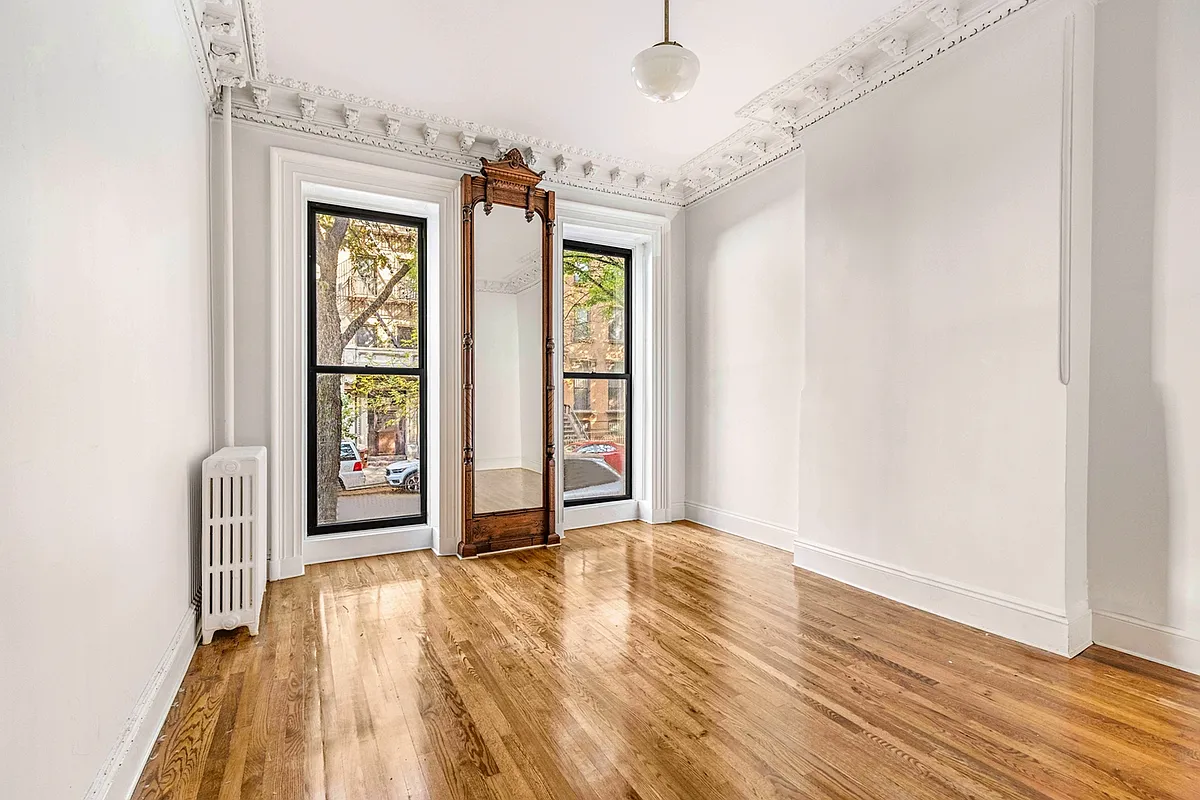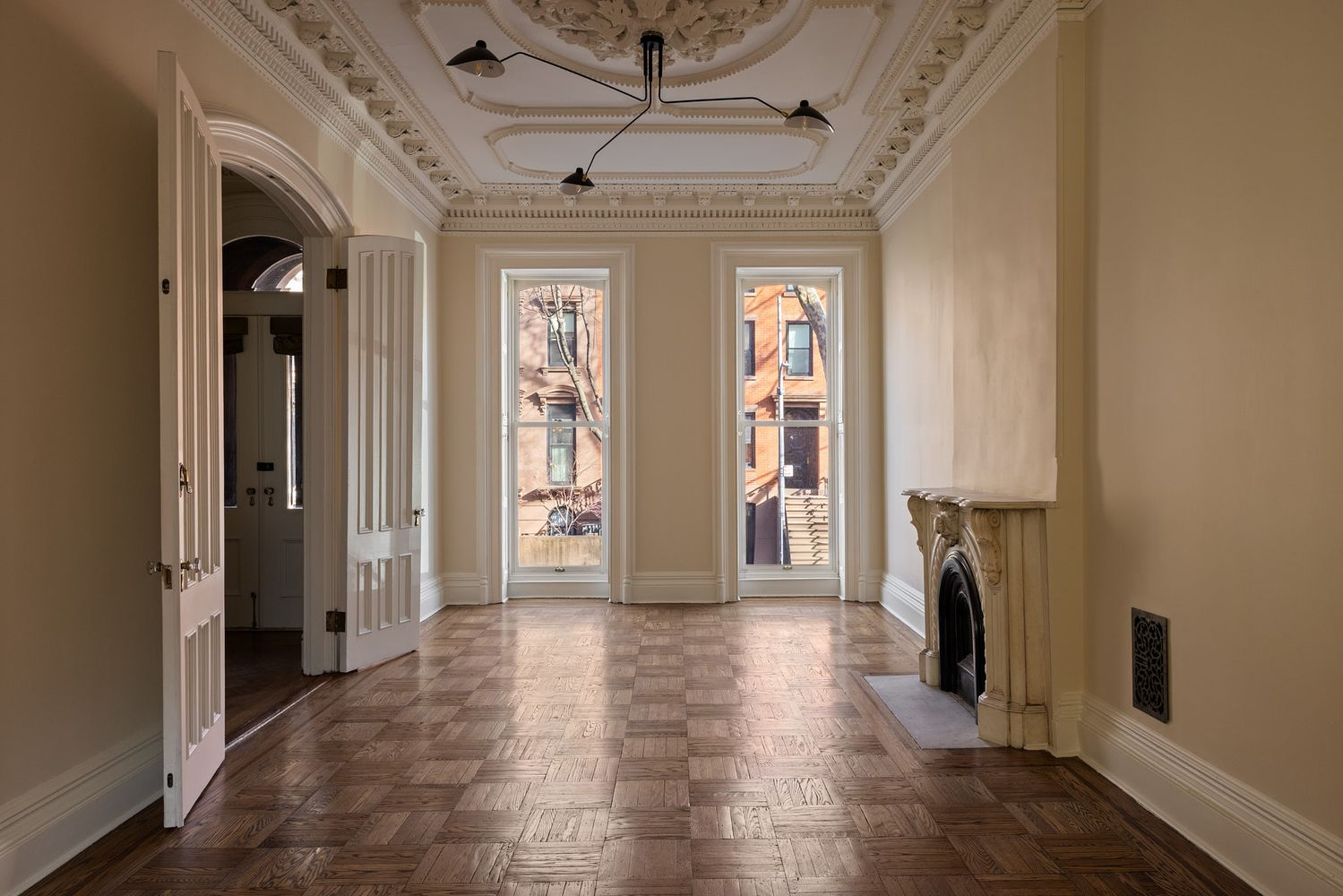First Tax Lien Sale in Years Has Struggling Homeowners Fearing the Worst
Dogged by unpaid taxes and water bills, indebted Brooklynites describe their struggles — and say new exemptions don’t help them.

Judith Barnes says she cannot afford repairs on a historic Cobble Hill makeshift theater space where she has lived for over 40 years, June 2, 2025. Photo by Ben Fractenberg/THE CITY
By Haidee Chu
This article was originally published on June 3 at 5 a.m. EDT by THE CITY
When Petal Sandiford stepped into the Flatbush YMCA several weeks ago, the 63-year-old home care worker had just one thing in mind: To get her late uncle’s house in Ocean Hill, where she and six of her relatives live, off the list for the property lien sale happening this Tuesday.
The controversial sale, created in 1996 under then-Mayor Rudy Giuliani, sells off property-related municipal debts owed by homeowners to privately managed trusts, which then attempt to collect debts and can foreclose on properties if the arrears remain unpaid after an additional year.
This year’s sale — originally scheduled for May 20 but postponed at the last minute to June 3 — will be the first since late 2021. After an outcry from homeowners, the City Council let the program expire in early 2022, before reauthorizing it last year along with reforms aimed at quelling advocates’ concerns around economic hardships exacerbated by the Covid pandemic.
But homeowners who spoke to THE CITY said these reforms, ranging from exemptions for seniors and disabled veterans to a deferral option for qualifying homeowners, hardly help. Many say they are still recovering from Covid disruptions, while some said they worry about losing their homes. All said the lien sale has put them under further financial distress.
As was true in the years past, this year’s sale will impact homes in predominantly Black and brown neighborhoods the most.
Sitting before a staff member from the city Department of Finance, which administers the sale, Sandiford fetched a folder full of documents from her bag: Notices informing her of the $38,246.82 debt owed on the property, her uncle’s death certificate, as well as real estate succession documents made out to her cousin shortly before their uncle passed away in 2022, following a seven-year battle in the aftermath of a stroke.

“We are not fully aware of what the charges are for,” Sandiford told the Finance staffer, who was at the YMCA that day to offer guidance and resources to homeowners trying to resolve their debts. “All I know is that my uncle was sick, and he was living on life-saving electrical support, and the city said they were going to pay so they’re not going to cut off the electricity.”
Sandiford and her cousin, Cleo Craig, became financially responsible for their uncle’s house when he passed during Covid, and said they had been unaware of the outstanding debts until receiving a notice from the city several months ago.
The unexpected financial burden has led to sleepless nights and has sent Sandiford to many corners of the city looking for answers to help resolve the debt, from the Department of Finance to the Department of Housing and Preservation to the YMCA, where the Finance staffer pointed her to a lookup tool showing a $94,927 debt owed by the property — $63,647 that HPD’s Emergency Service Bureau paid ConEd along with $28,084 in administrative fees.
“We had the assumption that the city was paying, I don’t know if that’s what came up to $38,000 after five years,” Sandiford said of the lien sale bill, which listed the minimum amount she must pay off on the debt to get the home of the lien sale list.
While Sandiford had heard radio advertisements about the exemption and deferral programs, she said, she was now learning that she and her cousin may not qualify for them because the deed is still technically under her late uncle’s name, even with documentation to prove succession rights.
The knotty problems Sandiford has encountered are all too common, according to Jacquelyn Griffin, senior staff attorney at Brooklyn Legal Services’ Neighborhood Economic Justice Project, which serves many clients dealing with property title issues related to deed theft and conflicts among heirs stirred up by real estate speculators, which also heavily affect the same areas where lien sales are common. In recent months, Griffin said, many heirs have come to her seeking help with the lien sale.
“Most people do want to pay — they do want to pay their taxes. But we’re running into problems, with DOF saying, ‘Oh, there has to be an order from the surrogate court or there has to be some other government documentation showing that this person is an heir to their property, and it was never really clear what that could be,” Griffin told THE CITY. “And their issues take time. It’s not straightforward, you have to really go in and know what you’re doing, otherwise it’s gonna take forever.”
Speaking to THE CITY last week, Sandiford was still hopeful that she and her cousin may qualify in time for a program that would take the property off Tuesday’s lien sale list by deferring their debt for a year. But even then, Sandiford, who along with her cousin rakes in about $4,000 to $5,000 a month as home care workers, said the bill would still feel almost insurmountable.
“I’m just praying. I get a little sad every day,” said Sandiford, who made time between conversations at the YMCA to call her 94-year-old friend to remind her to get help with her lien sale bill Sandiford said is over half a million dollars. “It will be difficult, but if there’s some way they can take off the interest, that would help significantly — a lot of it is interest.”
Ryan Lavis, a Department of Finance spokesperson, said nearly 3,600 properties have been removed from the lien sale list as of last week through the deferral and exemption programs, and that it will continue to process applications submitted by the deadline Monday to make sure qualifying homeowners are off the lien sale list.
“DOF remains firmly committed to helping New Yorkers stay in their homes. In partnership with our sister agencies and nonprofit groups, DOF has spent the past several months conducting an unprecedented level of outreach, focusing on the communities most at risk,” Lavis said. “This coordinated, citywide effort reflects our core mission: to allow New Yorkers to stay in their homes while ensuring everyone contributes their fair share to the services and infrastructure we all rely on.”
‘The System is Not Designed to Help’
Property-related tax delinquencies have climbed overall since 2019. And while those tax debts become the reason many homeowners end up facing the lien sale, Kevin Wolfe, deputy director of advocacy and public affairs at the Center for NYC Neighborhoods, a homeowner advocacy group, said a plurality of properties listed for this year’s sale came from unpaid water bills.
“A lot of other cities will just do a water shutoff, which is not great, but no one’s losing their home,” Wolfe said. “New York City, we do it differently, where you can actually lose your home.”
Siblings Joyce and Azmat Mckenzie are among the many homeowners who were on the lien sale list because of a water debt, with $28,000 owed in arrears, when they visited the YMCA for help several weeks ago. They said a representative from the Department of Environmental Protection was supposed to visit their home several days earlier to help resolve the issue, but didn’t show up.

“This all started during Covid,” said Joyce, 73, who worked as a nonprofit administrator until she retired 12 years ago. She’s thinking about returning to work to help foot the bill: “It’s bad because you work so hard all your life, you just want to retire and relax and be at home. And look at what they’re putting us through … We’re just trying to make it — pay the bills.”
Azmat, a 57-year-old retired MTA bus driver, chimed in, recalling his reaction to receiving the lien sale notice in the mail: “There’s a lot wrong with this country. You know, America’s gonna implode from the inside because it’s always the middle class, the working class that holds America together, but they’re the ones getting squeezed.”
Joyce and Azmat moved into their Flatbush home about 48 years ago, they said, when their mother saved and scraped together enough to move them out of a NYCHA development and into the three-family house. In the years since, it’s provided a stable foundation for them to raise their kids and grandkids, some of whom are college graduates and professional ballet dancers.
The siblings said they inherited the property when their mother passed, and have always worked hard to keep it in the family — especially as the neighborhood has gentrified over the years, with real estate agents knocking on their doors to try and entice them to sell, and tall glass buildings rising in places where old neighbors used to live in family homes.
“We want to pay it, of course. But we need to pay in a payment plan. Where are we going to get $28,000?” said Joyce, who was unlikely to qualify for the senior exemption because she co-owns the home with Azmat, bringing their combined annual income above the $58,399 eligibility threshold. “We want to keep the house, we don’t want the lien to sell it, but DEP didn’t show, so we’ll have to go to their office.”
Water debts tend to disproportionately affect Black and brown neighborhoods, Wolfe noted, because of aged and neglected water infrastructure in historically redlined areas, leading to more water main bursts and meter errors.
Larry Lyttle, 61, said he had spent $15,000 last year to get a water meter installed and to pay off an outstanding water bill that accumulated over the last two decades while living without one. The retired subway signal maintainer said his two-story one-family home ended up on the lien sale list because that hefty expense made it even more difficult to pay off $29,000 worth of property taxes that had accumulated since 2021, during the pandemic — about $10,000 of which is due to get him off the sale list.

“I don’t have this money left,” said Lyttle, who’s planning to tap into his 401K to pay off the debt. “I’m gonna be honest, the system is not designed to help the middle-class person.”
More Than a Home
For Judith Barnes, the lien sale came at the heels of a series of unfortunate events. She was already saddled with $350,000 in debt for an emergency repair in 2022 on her three-story, 160-year-old mixed-use building in Cobble Hill, she said, when notices of the lien sale came several months ago, along with a $100,000 delinquent tax bill from DOF.

After the repair, Barnes said, “I just didn’t have the money to pay the taxes. And I was told that, ‘Oh well, they don’t do the lien sale anymore, so you should be OK for a while.’”
She went on: “I kept hoping that I would figure out a way to deal with everything, and then the lien sale came and it just sort of hit home that I can’t afford to keep this building anymore.”
Barnes said she did not qualify for any exemption or deferral programs because her building is classified as a mixed-use property. But after getting the $100,000 bill cut by a few thousand dollars through a reduction for senior property owners, she privately borrowed $60,000 to pay off part of it and get off the lien sale list.
And with her various debts, Barnes said she has no choice but to put the building her family bought in 1982 onto the market.
“It’s awful. I’m miserable. I’m really heartbroken,” Barnes said. “This was my home that I built, and it was this incredible gathering space. So many people were in and out of there, and there were so many wonderful experiences.”
For nearly two and a half decades starting in 1998, Barnes ran an indie opera company out of the ground floor of the building while living in an apartment she had built for herself in the back.
In addition to hosting off-the-beaten-path professional performances, it was also home to a local amateur chorus that featured many Brooklynites, including students, fundraisers, and healthcare professionals. The double doors opened to the street during rehearsal sometimes, Barnes added, and children, wide-eyed, would sometimes walk in to bask in the music.
Tenants lived upstairs, too, and she charged them sub-market rents for tolerating the eccentricities of living above a performance space, until the structural repairs became necessary in 2022 and they moved out.
“If I were younger, I’d feel a different kind of energy to be able to start again, but I’m kind of worried about the trajectory that my life is going,” Barnes said. “I don’t really right now have a plan for my life, and I’m sorry I couldn’t offer to the world what I could’ve before anymore.”
In a newsletter she wrote to patrons of her opera company last year, Barnes revealed how she had been working on a piece about exile and displacement while living in the building. She explained how the new play was going to be a continuation of sorts to her last offering, Women of Salt and Longing, in which a woman looked back at her lost home and turned into a pillar of salt.
To her readers she wrote: “I admit it still frightens me how prescient that piece turned out to be.
“Did life imitate art? Does it always?”
Related Stories
- Protest Briefly Halts Hearing on NYC’s Controversial Tax Lien Sale System
- Upcoming City Tax Lien Sale Puts Brooklyn Homeowners at Risk, Advocates Say
- Controversial Tax Lien Sale Legislation Expires, Leaving Future Unclear
Email tips@brownstoner.com with further comments, questions or tips. Follow Brownstoner on X and Instagram, and like us on Facebook.





What's Your Take? Leave a Comment